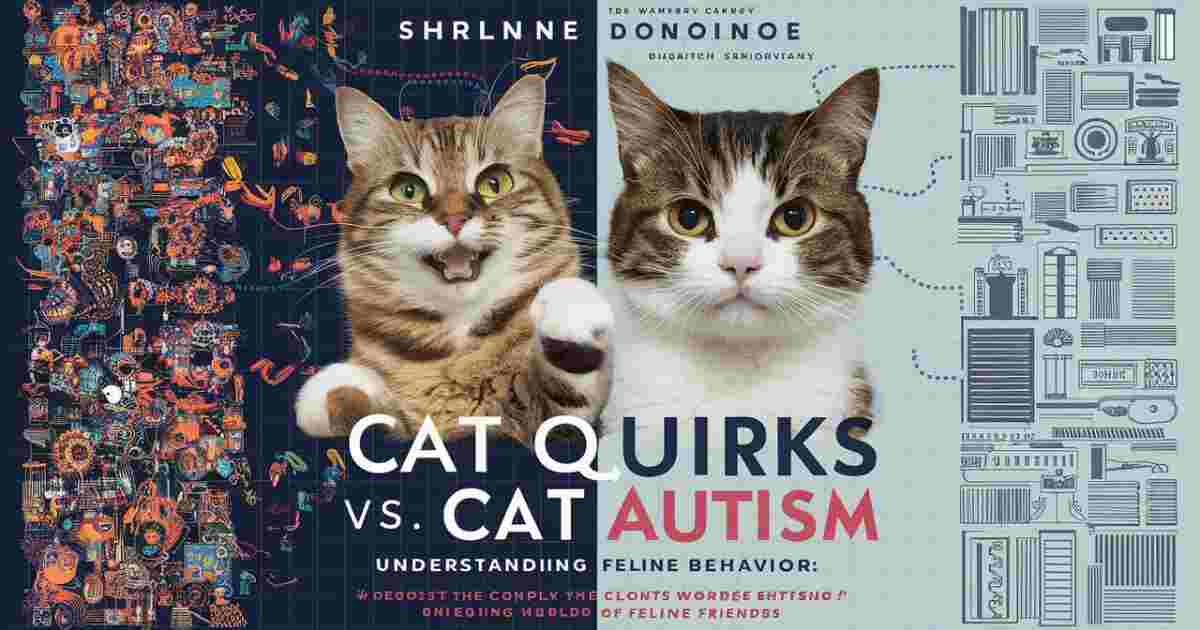Cat Quirks vs. Cat Autism: Understanding Feline Behavior
Our cats can bring us so much joy and love. Sometimes, though, their unique behaviors make us wonder – could my cat have autism?
Here’s the deal: Autism spectrum disorder (ASD) is a complex condition that’s mostly diagnosed in humans. While cats might show behaviors that resemble some autism symptoms, the question of whether cats can have autism isn’t clear-cut.

Exploring Feline Behavior Compared to Human Autism
Autism in humans involves difficulties with social interaction, repetitive actions, and narrow interests. These challenges arise from differences in how the brain works and understands the world.
Cats, however, have very different social lives, ways of communicating, and experiences with their senses compared to humans. What might seem like a cat being distant socially could just be their preference for alone time. Similarly, habits like constantly grooming or chasing small things might be instincts or ways they deal with stress.
So, What’s Up With My Unusual Cat?
While cats can’t have autism, some may show somewhat similar behaviors:
- Social Distancing: Some cats might not be as interested in interacting with people or other pets as much as other cats. This could be because they’re shy, had bad experiences in the past, or simply prefer being alone.
- Repetitive Actions: Walking back and forth, excessive grooming, or being fixated on a particular toy are common cat behaviors. If these actions start to dominate your cat’s daily routine, it might indicate they’re stressed or anxious.
- Sensitive Senses: Cats have very sharp senses. Loud noises, bright lights, or strange smells can overwhelm some cats, causing them to retreat or hide. This doesn’t necessarily mean they have autism, but it’s important to make their environment calm and safe if they’re sensitive.
Understanding Your Cat’s Needs
If you’re worried about how your cat behaves, the good thing to do is talk to your vet. They can check if there’s any health problem causing your cat’s quirks and advise on handling behavior.
Here are some tips for making your cat happy and comfortable:
- Respect their personality: Cats have different personalities. Let your cat decide how much they want to interact and give them quiet spots to go when they need space.
- Provide fun things to do: Toys that make them think, feeders that make them work for food, and scratching posts that keep them busy and entertained.
- Stick to a routine: Cats like routines. Feeding them cleaning their litter box at the same time every day and playing with them regularly helps them feel safe.
- Reward good behavior: Treats, praise, and playtime when they do what you want encourages them to keep doing it, and strengthens your bond.
Cat Autism Name?
Since cats can’t have autism diagnosed in them, there isn’t a specific name for “cat autism.” However, if you want a fun nickname that shows off your cat’s unique habits, you might call them “Mr./Ms. Independent” if they like their own space, “The Zoom Machine” if they love chasing things around, or “Sensory Star” if they’re sensitive to sounds or being touched.
Can Cats Have Autism?
Cats can’t be diagnosed with autism like people can. Their brains work differently, and behaviors that might look like autism (like being aloof or doing things repeatedly) could just be normal for cats or a sign they’re stressed. If you’re worried about your cat’s behavior, talk to your vet. They can check for medical issues and give you ideas to make your cat’s life more interesting.
The Last Word: Embracing What Makes Cats Special
While cats don’t experience autism like humans do, their unique personalities and needs are what make them extraordinary. By understanding their natural behaviors and giving them a loving, stimulating home, you can help your cat live happily and healthily. If you’re ever worried about your cat’s behavior, consulting your vet is a good first step.
